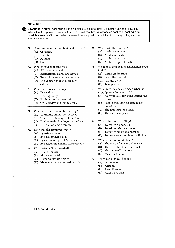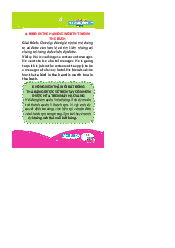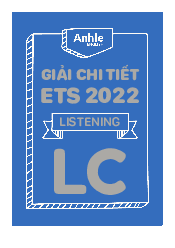









Preview text:
Lesson 4 Mixed Future Tenses (Part 1) –
Talking about the future in English can get a little complicated, because we have at
least seven different ways to do it: 1. WILL
I'll call you tomorrow. 2. GOING TO
I'm going to buy a new computer soon. 3. PRESENT SIMPLE (FOR FUTURE)
Our flight leaves at 8:30 Friday morning. 4. PRESENT CONTINUOUS (FOR FUTURE)
I'm getting together with my friends this weekend. 5. FUTURE CONTINUOUS
We'll be staying in New York for a week in July.
6. FUTURE PERFECT
By December, I will have sold my car.
7. FUTURE PERFECT CONTINUOUS
As of next week, I will have been living in this house for five years.
Instead of studying each type of future tense in isolation, this lesson is organized by
the types of situations when talking about the future – because in some cases, more
than one option is possible. Today we’ll cover four future situations, and we’ll finish
the rest of them in tomorrow’s lesson. Remember to respond to the "Put it into Practice" questions! www.espressoenglish.net © Shayna Oliveira 2014
Situation #1 - PREDICTIONS
When making predictions, projections, and other guesses about the future, it's
possible to use will or going to.
I think the economy will improve this year.
= I think the economy's going to improve this year.
Your father won't be happy when he finds out what you've done.
= Your father's not going to be happy when he finds out what you've done. Put it into practice!
Make two predictions about two things that you think will happen in your country
during the next five years. Use "will/won't" for one prediction, and "going to / not
going to" for the other prediction. 1. will / won't 2. going to / not going to
Some teachers say that going to is more certain than will, and here’s why: when
making a prediction based on some immediate present evidence that we can
observe right in front of us, we usually prefer to use going to:
The sky is getting dark and I just
heard some thunder - it's going to rain.
I'm not feeling well. I feel like I'm going to throw up.
Gina's not going to win the race - the
other runners are far ahead of her.
We're not going to have enough paint to finish this wall.
As you might have noticed, in fast spoken English, going to is pronounced gonna,
and not going to, not gonna.
Predictions often start with I think, I bet, I'm sure, I imagine, I expect, and I
hope. There is one detail with "I think" - when making predictions about something www.espressoenglish.net © Shayna Oliveira 2014
that will NOT happen, we usually say I don't think... will/going to and not I think... won't/not going to:
I don't think the current president will be re-elected.
I don't think the current president is going to be re-elected.
I think the current president won't be re-elected.
I think the current president isn't going to be re-elected.
It’s better to put the negative in front of think.
Situation #2A – Plans & Arrangements
When talking about plans that we have already arranged – we have already taken
some action to make the future plan a reality – we can say it in three different ways.
Imagine you are going on vacation next week, and
you have made a reservation in a five-star hotel.
You could use either going to, future
continuous, or present continuous for the future:
I'm going to stay at a five-star hotel next week.
I'll be staying at a five-star hotel next week.
I'm staying at a five-star hotel next week.
I will stay at a five-star hotel next week.
Here's another example. Let's say you want to meet your friend Larry for some
drinks after work tomorrow. You have already called him and agreed to meet at the
bar at 6 PM. Then you could say:
I'm going to meet up with Larry at the bar tomorrow evening.
I'll be meeting up with Larry at the bar tomorrow evening.
I'm meeting up with Larry at the bar tomorrow evening.
When using the last option, the present continuous for future use, we usually
include the specific time in the future (to avoid confusion with “actions happening at the moment”): www.espressoenglish.net © Shayna Oliveira 2014
I’m taking an intensive English course.
(right now, at this moment; the course is currently in progress)
I’m taking an intensive English course next month. (in the future)
I'm picking up my kids from school.
(right now, at this moment; I am currently doing this)
I'm picking up my kids from school at 3.
(spoken in the morning, before 3 PM; the action is still in the future) Put it into practice!
Take a moment to look at or think about your agenda for the next few weeks or
months. Say three things that are on your agenda: 1. I'm going to...
2. I'll be ________ing... 3. I'm _________ing...
Situation #2B – Intentions / Goals
When you have a future intention or goal (but which is not a confirmed, scheduled
arrangement on your calendar), it's best to use going to:
I’m going to read more books.
I’m going to start doing some volunteer work.
I'm not going to eat so much junk food this year.
I'm not going to buy that TV; it's just too expensive.
You can also use phrases like I hope to, I'd like to, I'm planning to / I'm planning
on, I might, I'm thinking about, and I'm considering to talk about future
intentions or possible future goals. See this lesson for some examples. www.espressoenglish.net © Shayna Oliveira 2014 Put it into practice!
Imagine it's January 1 and you are making your New Year's resolutions. Say one
thing you intend to do, and one thing you do NOT intend to do:
This year, I'm going to...
This year, I'm not going to...
Situation #3 – Promises, Offers & Decisions in the Moment
For promises, offers, and decisions made in the moment of speaking, we always use will/won't:
Decisions made in the moment: Ordering at a restaurant:
I’ll have the salmon with a side order of vegetables. While shopping: "These T-shirts are on sale."
"In that case, I'll buy three." Offers & Promises:
I’ll help you with your homework.
We’ll give you a ride to the train station. I’ll call you at 5:00. I’ll always love you. I won't let you down. Put it into practice!
#1 - Imagine that your best friend is very sick and can’t leave the house. Make her
two offers for things that you can do to help her. I'll... www.espressoenglish.net © Shayna Oliveira 2014 I'll...
#2 - Imagine that you've just had a big fight with your boyfriend/girlfriend. Now you
are making up, and you want to promise one thing you WILL do in the future and
one thing you WON'T do anymore. I'll... I won't... What about "shall"?
In the past, shall was a more formal alternative to will. In British English, shall is
supposed to be used with I/we, and will is supposed to be used in all other cases. In
American English, shall is not commonly used.
Here are a few places where it is occasionally used - although again, these all sound
very "formal." The more common forms of the phrases appear below italicized in blue:
Giving & requesting suggestions with I/we:
Shall we start the meeting?
Should we start the meeting?
Shall I open the window?
Should I open the window?
Where shall we go today?
Where should we go today?
Offers/promises with I/we:
I shall make the necessary arrangements.
I will make the necessary arrangements.
We shall send you the information by Friday.
We will send you the information by Friday.
We shall not tolerate this injustice.
We will not (won't) tolerate this injustice.
Formal / legal language - obligation/requirement: www.espressoenglish.net © Shayna Oliveira 2014
All employees shall wear uniforms to work.
All employees must wear uniforms to work.
Students shall not enter the faculty lounge for any reason.
Students must not enter the faculty lounge for any reason.
Situation #4 – Scheduled / Regular Events
We use the present simple for “scheduled events” in the future:
Transportation schedules
(flights, trains, etc.)
Our flight leaves at 8:00. Conferences and events
(meetings, lectures, classes)
The conference starts next Thursday.
Things that operate on a regular
schedule (bank or store opening / closing, etc.)
The supermarket closes in 15 minutes.
My favorite TV show is on tonight.
These are different from “plans and arrangements” because in general, they are
things we have no control over. They are simply scheduled on an official calendar –
and we use the present simple for them, even though they are in the future. Summary
For predictions about the future, use will or going to (use going to with immediate present evidence)
For plans and arrangements, use going to, future continuous, or present continuous
For goals and intentions, use going to
For promises, offers, and decisions made at the moment of speaking, use will
For scheduled, regular events, use the present simple
Shall is not very common anymore, but it can be used with suggestions,
offers, and promises with I/we, as well as in formal/legal writing www.espressoenglish.net © Shayna Oliveira 2014
You’ve finished Lesson 4! Now take the quiz and do the practice exercises to review
the future tenses you learned in today’s lesson. Tomorrow, we’ll continue our study
by looking at some more future situations.
Quiz – Lesson 4 – Mixed Future Tenses (Part 1)
1. My summer vacation starts / will start June 15. I'm going to / I will visit my grandparents in Florida.
2. Don't worry, I don't make / won't make the same mistake again.
3. I take / I'm taking the day off tomorrow, so I'll get / I'm going to get back to you on Wednesday, OK?
4. After I finish this book, I read / I'm going to read the next one in the series.
5. I prepare / I’ll prepare the salad while you make the soup.
6. I'm bored... I don't know what to do. Maybe I'll take / I'll be taking a walk.
7. I want to be a happier person, so I've decided that I'm not going to complain
/ I won't be complaining about the little things.
8. Paula says she's going to lose / she's losing 20 pounds by the end of the year. She's very determined!
9. Randy speaks / Randy's speaking at the international event in September.
10. Scientists say that climate change will be having / will have serious consequences for the planet.
11. She's going to have / She will have twins next month - her belly is huge!
12. The exam is probably taking / will probably take about an hour to finish.
13. What are you doing / will you do this weekend?
14. I have a dentist appointment on the 23rd. I’ll get / I’ll be getting my teeth whitened.
15. “My class ends / is ending at 4:30.”
"In that case, I'll / I'm going to pick you up at quarter to five." www.espressoenglish.net © Shayna Oliveira 2014 Writing Task
Write about your short- and long-term goals and dreams for the next 10 years. What
do you hope to accomplish? What steps are you planning to take to get there?
E-mail me your text at shayna@espressoenglish.net – and I’ll review it and send you back my comments. www.espressoenglish.net © Shayna Oliveira 2014
Answers – Lesson 4 – Mixed Future Tenses (Part 1)
1. My summer vacation starts June 15. I'm going to visit my grandparents in Florida.
2. Don't worry, I won't make the same mistake again.
3. I'm taking the day off tomorrow, so I'll get back to you on Wednesday, OK?
4. After I finish this book, I'm going to read the next one in the series.
5. I’ll prepare the salad while you make the soup.
6. I'm bored... I don't know what to do. Maybe I'll take a walk.
7. I want to be a happier person, so I've decided that I'm not going to complain about the little things.
8. Paula says she's going to lose 20 pounds by the end of the year. She's very determined!
9. Randy's speaking at the international event in September.
10. Scientists say that climate change will have serious consequences for the planet.
11. She's going to have twins next month - her belly is huge!
12. The exam will probably take about an hour to finish.
13. What are you doing this weekend?
14. I have a dentist appointment on the 23rd. I’ll be getting my teeth whitened.
15. “My class ends at 4:30.”
"In that case, I'll pick you up at quarter to five." www.espressoenglish.net © Shayna Oliveira 2014




